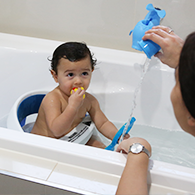Introducing allergens
- The most common foods that people are allergic to are egg, peanut, cow’s milk (dairy), tree nuts, soy, sesame, wheat, fish, and other seafood
- When introducing solid foods to your baby, include common allergy causing foods before 12 months of age suitable to their age, (for example well-cooked egg and smooth peanut butter). This may reduce the chance of your child developing a food allergy
- Once introduced, continue to give these foods to your baby regularly (twice per week), as part of a varied diet, to maintain tolerance. Trying a food and then not giving it regularly may result in your child developing a food allergy
- Use nut pastes and nut spreads for children under 3 as they can choke on whole nuts
- Some babies may still develop a food allergy despite following this advice
- If your baby has an allergic reaction, stop giving that food and get medical advice or call 000 (Triple Zero).
| Egg | Cow's milk (dairy) | Peanut |
 |  |  |
| Treenut | Soy | Sesame |
 |  |  |
| Wheat | Fish | Shellfish |
 |  |  |
Signs of a food allergy
Around 1 in 10 babies under the age of one develop a food allergy but many are outgrown with time. Your child’s chances of having an allergy are increased if an allergy or eczema runs in the family.
Signs of a severe allergic reaction (anaphylaxis), are related to the immune system and include difficult/noisy breathing or your baby becomes pale and floppy, or if there is tongue swelling. These symptoms usually appear soon after your child has a particular allergen.
Other signs of an allergic reaction can include:
- Hives
- Eczema
- Asthma, wheeze, difficulty talking
- Swelling of face, lips and/or eyes
- Tummy pain, vomiting
Intolerances to food usually involve the digestive system. Diagnosis is usually by avoiding the food and reintroducing it to see if there’s any effect. Symptoms can include:
- Tummy pain
- Gas or bloating
- Diarrhoea
- Irritable bowel syndrome
- Rashes
- Hives
- Recurring mouth ulcers
- Headaches
Every child is different so it is best to speak with your health professional if you are concerned.
Further information on allergies in children can be found at:
- Australasian Society of Clinical Immunology and Allergy (ASCIA)
- National Allergy Strategy Nip Allergies in the Bub (allergy prevention project)
- ASCIA Guidelines for Infant Feeding and Allergy Prevention
We also have factsheets that you can read on allergies in children:
- Cow's milk allergy and milk free diet
- Egg Allergy and egg free diet
- EpiPen® Use
- Food Allergies and Eczema
- Fruit and vegetable allergy
- Latex allergy
- Peanut allergy and peanut free diet
- Seafood allergy (includes fish and shellfish)
- Sesame free diet
- Soy allergy and soy free diet
- Tree nut allergy and tree nut free diet
- Allergy and allergy tests
- Hives (Urticaria)
- House dust mite allergy- what should you do?








